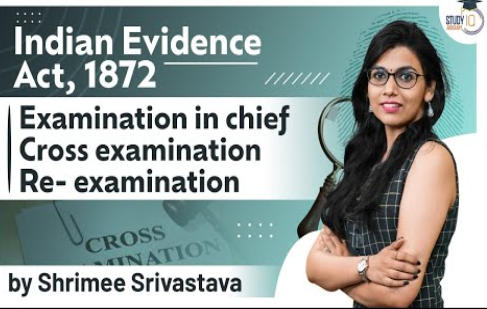Table of Contents
Examination in Chief, Cross Examination, Re-Examination
Examination-in-chief:
Section 137 : Examination-in-chief:
- The examination of a witness by the party who calls him shall be called his examination-in-chief.
- After taking oath the witness has to give answers the questions asked by the party who has called him before the court.
- In this process all material facts within the knowledge of the witness are recorded to prove his case.
- In examination-in-chief the testimony is strictly confined to the facts relevant to the issues only, and not to the law.
- No leading question is permitted to be asked unless the court allows it.
- In conducting examination-in-chief like of a witness specially in serious cases, the public prosecutor should take abundant precaution in examination a witness.
Cross examination
Cross-examination:
- The examination of a witness by the adverse party shall be called his cross-examination.
- After the examination-in-chief the opposite party shall be called to examine the witness.
- Where in cross-examination of a witness, nothing appears suspicious, the evidence of the witness has to be believed.
- It is the right of the opposite party to cross-examine the witness to expose all relevant facts which are either left or not disclosed in the examination-in-chief.
- It is “one of the most useful and efficacious means of discovering the truth.”
- The right of cross- examination can be exercised by the co-respondents when their interest is in direct conflict with each other.
- Although the range of cross-examination is unlimited, under the section the court has discretionary power to exclude irrelevant questions.
- The person (complainant or any of his witness who gave evidence on affidavit after being summoned by the accused, can only be subjected to cross-examination as to fact’s stated in affidavit.
Re-examination:
- The examination of a witness, subsequent to the cross-examination by the party who called him, shall be called his re-examination.
- The examination of witness subsequent to cross-examination by the party who called him, is called re-examination.
- If the party finds inconsistencies or discrepancies arising out of cross-examination he has the right to re-examine his own witnesses.
- But, in case of re-examination no new question or fact shall be permitted to be asked without the court’s consent. Similarly, no leading question can be asked.
- It was held that the re-examination of witness is not confined to mere clarification of ambiguities arising in cross- examination.
- If any new matter is introduced in re-examination the adverse party must be given opportunity for cross-examination. It is generally called re-cross-examination.
Download| Free PDF






















 WhatsApp
WhatsApp